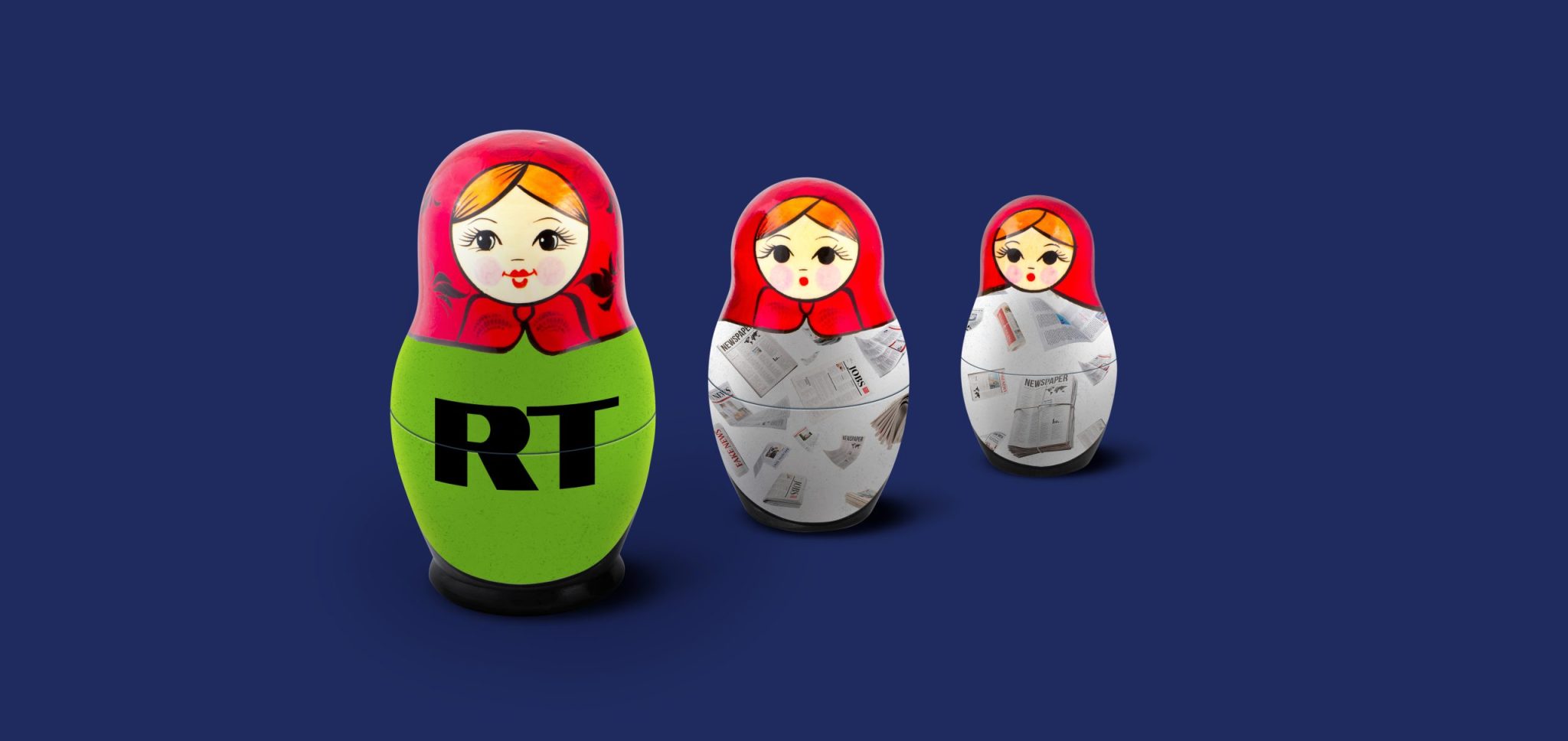Executive Summary
Over the past year, ASD at GMF, the University of Amsterdam (UvA), and the Institute for Strategic Dialogue (ISD) have collaborated to develop the Information Laundromat, an open-source tool to uncover content and metadata similarities between and among websites. This report, the second in a series of reports dedicated to exploring content laundering practices across the web, highlights the myriad pathways through which content from Russian state media website RT.com reaches audiences in Europe and the United States. Using the laundromat tool, we queried more than 1,500 RT articles published in 2023 and discovered roughly 400 domains–ranging from mirror sites and content aggregators to faux local news outlets and sites ostensibly focused on spirituality and men’s interests—that republished articles that were identical or nearly identical to those that originated on RT.com. In some cases, these sites were transparent or quasi-transparent about sourcing content from RT; in others, the provenance of the content was opaque or seemingly intentionally masked. In all cases, these sites allowed Russian state media to reach a wider audience, including in the EU, where RT itself is banned.
Key findings:
- We discovered RT articles reposted to third-party websites targeting audiences from Iraq to Ethiopia to New Zealand, often without any indication that the content was sourced from a Russian propaganda outlet. In total, we found content originally published on RT.com on websites with country code top-level domains (for example, .ru, .de, .uk) registered in at least 40 countries on six continents.
- Despite RT being effectively blocked in EU search results, RT content was widely available in Europe when republished on third-party websites whose domains are not subject to sanctions. We found more than 3,019 unique links on 316 domains in EU search results that linked to content that was identical or a near-duplicate to queried RT articles.
- Though we do not categorize link sharing on social media as “information laundering”, social media and user-generated video sites play a significant role in the dissemination of laundered RT content in search results. Reddit and YouTube ranked among the 15 most observed domains in our study, even though Reddit has banned all links to RT and YouTube has blocked all channels affiliated with RT. On Reddit, users bypassed restrictions by linking to RT articles posted on mirror or content reposter sites; on YouTube, RT articles were narrated using an automated text-to-speech generator. Those tactics allowed content from RT to not only appear on those platforms but to spread across the open web, boosted by the “authoritativeness” of those respective domains. In our study, we also found links on tested search engines of original or reposted RT articles posted on Gab, Telegram, Facebook, X (formerly Twitter), LinkedIn, Substack, VKontakte, Instagram, Pinterest, 8kun, and Rumble.
- RT articles were republished, verbatim, on state-controlled or state-captured media outlets in Cambodia, Lebanon, Namibia, Nigeria, Zimbabwe, Yemen, and Iran. We also found evidence of RT content repeatedly republished on Al Manar TV (almanar[.]com[.]lb), a Lebanese outlet owned and operated by Hezbollah that is designated a “special terrorist entity” and banned in the United States and multiple European countries.
- Many of the sites that regularly repost RT content are not, at least overtly, news sites. This includes sites like manstuffnews[.]com, a site largely dedicated to sports, grilling, cars, and other stereotypical “men’s interests”, but whose “world news” section is sourced almost exclusively from RT. There are also a number of sites ostensibly focused on wellness, spirituality, and religion that launder RT content—including a site connected to a Christian ministry in Texas, one focused on the rapture, and a “conspirituality” site connected to an alleged human trafficker that blends wellness, new age religiosity, and pro-Kremlin geopolitics.
- A number of laundering sites in our study were focused primarily or exclusively on the Middle East, most with a distinctly pro-Palestinian editorial line. Because our study used articles published in 2023 during the Israel-Hamas war, it is not surprising that there was a disproportionate number of RT op-eds in our data that focused on the region. The pollination of pro-Palestinian sites with RT content is also not surprising given Russia’s position on the war and the number of RT contributors who are openly aligned with pro-Palestinian causes. However, many of the RT articles republished by pro-Palestinian sites had nothing to do with the conflict or even the region, including articles alleging that the “EU is cracking down on democracy in Moldova” and that “Western propaganda” is responsible for “burying the Chinese economy”.









